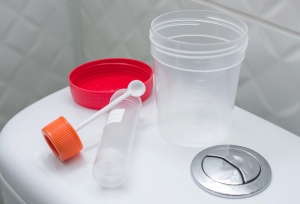 As a functional medicine practitioner my aim is to give relief to my clients by understanding the root cause(s) for their digestive issues. Alongside a detailed case history a stool test will often provide me with invaluable information and help to design a tailored programme. Stool testing can actually save a lot of time and the result can also be a great catalyst for change for clients.
As a functional medicine practitioner my aim is to give relief to my clients by understanding the root cause(s) for their digestive issues. Alongside a detailed case history a stool test will often provide me with invaluable information and help to design a tailored programme. Stool testing can actually save a lot of time and the result can also be a great catalyst for change for clients.
The test involves taking 3 samples of your stools over 3 consecutive days, you are provided with the instructions and equipment and this makes it relatively easy. Turnaround time is usually 10 days.
So what can you find out from doing a comprehensive stool analysis?
1. Microbiome abundance and diversity
Individuals suffering from ill health such as IBS and IBD show a narrowing in microbial diversity which makes them more susceptible to bacterial infections that can contribute to gastrointestinal symptoms. A common finding in the gut of people with IBS is a decline in Bifidobacteria a predominant species of bacteria responsible for the production of vitamins, detoxification and most importantly the prevention of overgrowth of pathogenic bacteria.
We get this diversity from eating a diverse diet so this is why long term restrictive diets such as the low FODMAP are only recommended for a short period of time. If the results show a low diversity and abundance slowly increasing the variety of plants food in the diet will help.
2. Detection of pathogenic bacteria, viruses and parasites
Acute gastrointestinal infections is one of the most common triggers for IBS. The identification of pathogens could therefore improve treatment strategies and patient outcomes. Gut infections can lead to dysbiosis which is a condition when the gut bacteria become imbalanced harbouring more pathogenic than beneficial bacteria. Signs of dysbiosis is often detected in individuals who suffer from IBS and IBD. Additionally, if pathogenic cultures are identified, a sensitivity panel is provided to facilitate the potential selection of pharmaceutical or natural treatment agents to address your particular infection. Oregano, Garlic, Berberine are some of the herbal agents that can be used.
3. Detection of yeast overgrowth
Common signs include: fatigue, bloating, gas, diarrhoea and/or constipation. This yeast-like fungus, may naturally be present in your intestines, and its growth is usually limited by your microflora but if Candida is allowed to grow due to a weakened immune system, the harmonious balance between it and the “good” bacteria is upset, resulting in intestinal candidiasis. The fungus is able to latch on to the gut wall and can create inflammation leading to the gut hypersensitivity associated with IBS. Addressing the overgrowth may lead to a significant reduction of symptoms.
4. Pancreatic Elastase
A digestive enzyme secreted by the pancreas that breaks down protein in food. Insufficient production may contribute to loose stools indigested food in stools nausea, reflux, bloating or food intolerances. Digestive enzymes supplementation may be considered.
5. Total Faecal Fats
Biomarker of fat breakdown and absorption. Fat in the stools may indicate fat malabsorption and can contribute to GI dysregulation. It can also suggest high dietary fat intake and parasite infection.
6. Faecal secretory IgA (SIgA)
This marker provides important information regarding gastrointestinal immune response. Chronic stress is commonly associated with low SIgA and elevated SIgA is an appropriate response to virus pathogens yeast and viruses in the GI tract and may also indicate sensitivities to foods.
7. Short Chain Fatty Acids (SCFA)
Short chain fatty acids are the end product of the bacterial fermentation process of dietary fibre and play an important role in our overall health and the health of our GI tract. Sufficient production will protect against intestinal dysbiosis (an imbalance of gut bacteria) by decreasing the PH of your colon so that the environment is unsuitable for pathogens to thrive. SCFA Have and anti-inflammatory effect on the whole body. If inadequate eating a more diverse plant based diet is a good start but other imbalances in the GI tract will also need to be addressed.
8. Calprotectin
This biomarker is useful in differentiating between Inflammatory Bowel Disease (IBD) and Irritable Bowel Syndrome (IBS). If found to be elevated it indicates mucosal inflammation and referral will be made to your GP for further investigation.
9. Beta-Glucuronidase
An enzyme made mainly by intestinal bacteria. Elevated level may indicate an unfavourable environment in the gut allowing for possible recirculation of toxins and hormones. It can be associated with a high fat high protein low fibre diet or constipation. In this case supporting liver function and detoxification will be important.
10. Akkermensia muciniphila
These beneficial bacteria strengthen your gut lining and support the health of your microbiome. In certain conditions such as IBS Akkermansia is commonly less abundant which can lead to intestinal permeability and hypersensitivity. Consuming Polyphenol foods has been shown to increase the level of Akkermensia for some individuals.
2 responses to “Stool Testing – Test Don’t Guess”
Leave a Comment:
About Gwen Gibson



Hello,
I’m wondering if I have gut disorder due to my constant uncomfortable feelings on this area so I guess the test would be great for it.
Hi Carolina,
I am so sorry that nobody has got back to you . I was just looking at my post and noticed your comment
Yes it would definitely help to highlight if there is an imbalance.
You could maybe get in touch with me my address is gwen@gwengibson.co.uk and we can further discuss .Take care and hope to speka to you soon Gwen